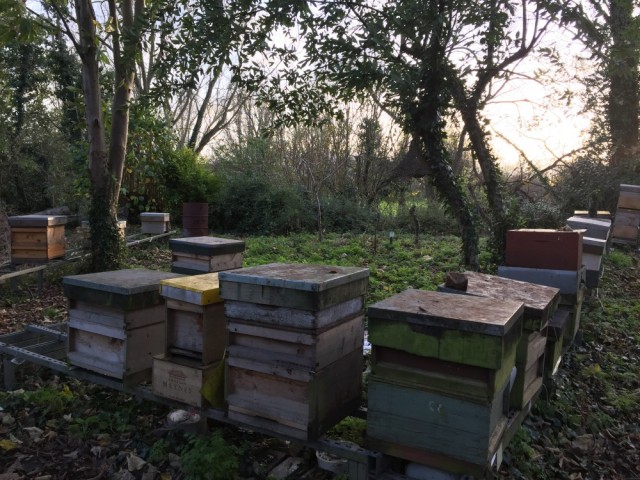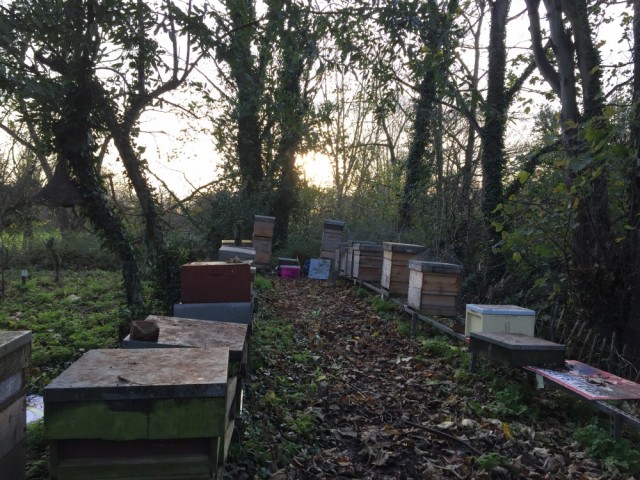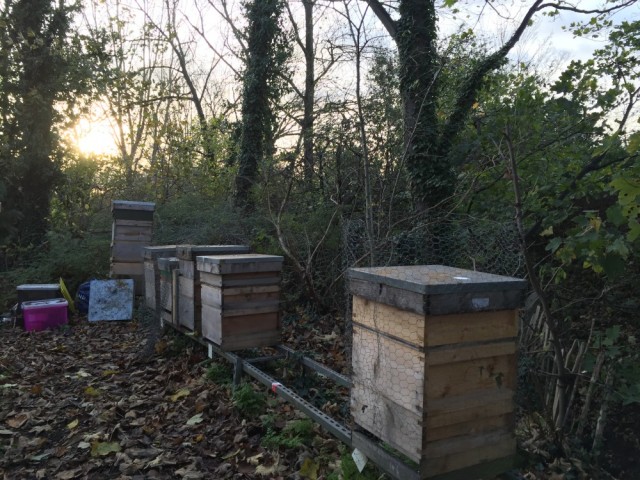It has taken a while to come, but at last we have proper see-your-breath-in-the-air, see-the-sparkling-frost-in-the-mornings cold. The kind of cold that stops honey bees flying. I walked round the apiary yesterday and the hives could have been abandoned, so quiet were the entrances. Hiding inside – several thousand bees, hundreds of woodlice, a few gigantic spiders and at least one hibernating queen wasp.
It is too cold for syrup now, so a slab of fondant has been placed over their crown-boards. Pepper’s girls also have one super, Melissa’s two. Peppermint’s bees were a new split from Pepper’s hive this year and didn’t manage to fill out a super, but they do have plenty of honey in their brood box.
Mouse-guards are on, chicken wire to protect against woodpeckers has been placed around the hives and we are using special insulated roofs Tom made for us. Varroa boards left out so that the hives have ventilation from below through the open-mesh floors. I think of it as going into battle, assembling all the weapons we have against the elements and creatures that prey on bees. The bees will do most of the work of course, huddling protectively round their queen as outside the wind howls, the rain lashes and the frost bites.
These are a few last details but really preparing the bees for winter goes on all year long. You are always preparing the bees for winter – because the best weapon is having healthy bees to begin with. A combination of luck, the local environment and how well you looked after the bees during the year.
It’s things like how clean your equipment is, how recently you replaced your brood combs, how low you kept varroa levels, how much honey you left them, how many times you managed to inspect the colony without squashing the queen or tripping over and dropping boxes of bees everywhere. What was the weather like, were new queens able to mate well, could the foragers fly often, were there good sources of forage around for them to find? If all that went well, then the colony has a good chance of surviving whatever winter can throw at them. Just don’t forget to put your mouse-guard on.
What are your beekeeping weapons of choice against winter’s fury?




Very educational post.
LikeLiked by 1 person
Thanks Stephen 🙂
LikeLiked by 1 person
. . . makes it sound like both a source of stress and a lot of work. I’m curious about the hibernating queen wasp. Do you know that for a fact or are you guessing? Why wouldn’t the bees kill it? Or, you remove it?
My preparations involve heading down to the Costco and buying some clover honey. Not as satisfying as harvesting my own, but I view it like books . . . some people buy what other write and some write their own.
LikeLike
Stress and work but also love and joy to go with that. I found the queen wasp in a stack of empty equipment we’re storing. She wasn’t in with the bees so I let her be. Wasps have their part in the ecosystem and I find them a nuisance to the bees rather than a real threat.
Enjoy that clover honey – one of my favourites.
LikeLike
My “beekeeping weapon of choice” … mead 😉
More seriously … early application of an effective miticide (http://theapiarist.org/sublimox/) and good levels of stores. I think many feed and treat too late (and appreciate that bringing colonies back from the heather enforces this). I was asked last week (!) whether it was too late to start feeding and ‘do I need to do anything about mites?’. D’oh!
Early treatment ensures the queen starts laying again (assuming a mid/late summer break, or an enforced break due to thymol/Apiguard) in a hive with low mite levels, guaranteeing that new workers – the ‘winter bees’ – will be raised in a colony with low deformed wing virus levels. Since DWV shortens the lifespan of bees this helps the colony remain strong throughout the winter.
They look pretty robust hive stands …
David
LikeLike
Ha ha! Completely agree with you about mites and stores. And mead, obviously.
The hive stands were put in place years ago by an Ealing association member. They’re great!
LikeLike
We are entering our first winter with the bees. I am glad you mentioned you are leaving the varroa boards out. We have too, as we are very humid here, but it still seems a bit cruel to leave their door open in the winter. Amelia
LikeLike
I know what you mean but of course there’s that old saying that damp kills bees, not cold. Before open mesh floors beekeepers used to use matchsticks under the crown board to provide a ventilation air gap. We go for plenty of insulation up top to keep them cosy. Cold winters can actually be beneficial as then the bees are less active so go through their stores more slowly.
LikeLiked by 1 person
I’m in my first season of beekeeping in Northumberland. I’ve really enjoyed catching up with your blog! It’s given me loads to think about& I’ve found your descriptions of beekeeping events/talks and book reviews helpful& interesting. I suspect I’ll keep referring back to various posts! It seems like beekeeping in an urban environment has a few additional challenges but I’ve not been beekeeping for long enough to be totally sure of that. Anyway in common with you& all uk beekeepers I just have to hope my bees make it through the winter. Good luck with yours too& keep blogging!
LikeLike
Thanks Bridget, that’s very kind of you and lovely to hear. Best of luck to you and your bees, fingers crossed they make it through.
LikeLike
Very interesting – but what did you do about the queen wasp?
LikeLike
Thanks Philip. I found her in the roof of a stack of empty equipment we’re storing. She wasn’t in with the bees so being a softie I put the roof back and let her be. I am not fond of wasps but they do prey on some garden pests and also I feel a bit sorry for them as so many humans are out to get them. When I was at the apiary on Saturday a member of the public turned up with a dead wasp, he wanted to make sure it was a wasp and not a bee as the council had told him they would only send a pest control person round to get rid of wasps.
LikeLike
That sounds very sensible Emily, the only time I draw the line with queen wasps is when they try to build a nest inside our house!
LikeLike
The chicken wire for defense against the woodpeckers is interesting. Is it that they find it annoying to hold on to and aim though? So far our woodpeckers have shown no interest in the hives, I’m happy to say. The post is, as always, brilliant and informative, and the photos lovely.
LikeLike
Thanks! Yes, I think that’s the idea. It’s rare for woodpeckers to attack hives but has happened to some Ealing members at times when the ground is very frosty and too hard for them to dig for insects.
LikeLike
Well done Emily, I’m doing mine today. I’m not sure that we’ve ever had woodpeckers here at Hen Corner, but seeing as the squirrels took all my almonds and we’ve got a mouse in the bee shed, I think I’ll take precautions!
LikeLike
Good idea, sounds like the local wildlife is running riot!
LikeLiked by 1 person
How are your bees reacting to the warm temperatures in your area? That last I heard it was well above freezing.
I ask because I’ve heard from a many beekeepers in the US dealing with unusually warm weather and their bees are more or less acting like it’s spring, flying all around, eating through all their honey, building comb everywhere they can, etc. It’s kind of a nightmare for first year beekeepers.
LikeLike
After I wrote that post we had an unusually warm December – it was quite surreal to see my bees flying and even finding two types of pollen from somewhere. Possibly from Mahonia and ivy. We even have daffodils out, three months early! Worrying as I don’t want the winter bees exhausting themselves by foraging and then dying younger than they usually would. They are going through their fondant faster than usual.
LikeLike
Recipe for safe through the winter is a strong and healthy families with adequate food
LikeLike